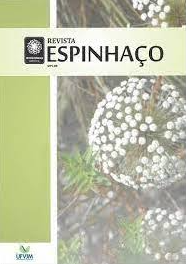Scientific data governance and authorship policy in transdisciplinary research and innovation environmental projects
DOI:
https://doi.org/10.5281/zenodo.16929780Keywords:
scientific writing, scientific publication, ethics, research, innovation, complianceAbstract
Effective scientific data governance and equitable authorship attribution are essential to the success of large-scale, transdisciplinary research initiatives. Drawing on our experience in two major programmes, namely “Damage Diagnosis Programme following the Brumadinho dam disaster” in the Paraopeba River basin (PDD) and “IBI UHE-Furnas & UFMG” project, in the Grande River basin; each involving hundreds of investigators from academia, industry and civil society, we developed and implemented a comprehensive governance model. Core components include (1) field data collection with standardised protocols, which are curated to maintain consistency, reliability and reproducibility and (2) a structured authorship policy, which needs to be as objective as possible and guarantee fairness of credit among participants. We thus developed a policy based on the CRediT taxonomy, where we require least four contributorship roles (including writing as a mandatory one) for authorship and offering co-authorship eligibility to those meeting four roles; and a diverse Scientific Committee to oversee proposal review, manage conflicts of interest and prevent redundant research. All manuscripts must undergo centralised submission and use only validated datasets, while acknowledgements and compliance statements align with relevant data-protection and ethical regulations. Implementation of this framework has clarified contributor roles, mitigated gift and ghost authorship, fostered transparent workload distribution and enhanced inclusivity, particularly for early-career and under-represented researchers. Our findings demonstrate that a deliberately flexible yet rigorous governance-and-authorship policy can balance autonomy, fairness and accountability. This model provides a replicable blueprint for other large, collaborative research programmes seeking to fairly uphold integrity, promote diversity and accelerate trustworthy scientific discovery.
References
Adams, J. (2013). Collaborations: The fourth age of research. Nature, 497, p. 557-560.
Allen, L.; Brand, A.; Scott, J.; Altman, M.; Hlava, M. (2014). Credit where credit is due. Nature, 508, p. 312-313.
Brand, A.; Allen, L.; Altman, M.; Hlava, M.; Scott, J. (2015). Beyond authorship: Attribution, contribution, collaboration, and credit. Learned Publishing, 28, p. 151-155.
Burnette, G. A. (2022). Managing environmental data: principles, techniques, and best practices, 340.
Cooke, S. J.; Young, N; Donaldson, M. R.; Nyboer, E. A.; Roche, D. G; Madliger, C. L; Lennox, R. J.; Chapman, J. M.; Faulkes, Z.; Bennett, J. R. (2021). Ten strategies for avoiding and overcoming authorship conflicts in academic publishing. Facets, 6, p. 1753-1770.
Ding, J.; Liu, C.; Zheng, Q.; Cai, W. (2021). A new method of co-author credit allocation based on contributor roles taxonomy: proof of concept and evaluation using papers published in PLOS ONE. Scientometrics, 126, p. 7561-7581.
Farley, S. S.; Dawson, A.; Goring, S. J.; Williams, J. W. (2018). Situating Ecology as a Big-Data Science: Current Advances, Challenges, and Solutions. BioScience, 68, p. 563-576.
Freeman, R. B.; Huang W. (2014). Collaboration: Strength in diversity. Nature, 513, p.305.
Gasser, U.; Almeida, V. A. F. (2017). A Layered Model for AI Governance. IEEE Internet Computing, 21, p. 58-62.
Gibert, K.; Horsburgh, J. S.;Athanasiadis, I. N.; Holmes, G. (2018). Environmental Data Science. Environmental Modelling & Software, 106, p. 4-12.
Hinnant, C. C.; Stvilia, B.; Wu, S.; Worrall, A.; Burnett, G.; Burnett, K.; Kazmer, M. M.; Marty, P. F. (2012). Author-team diversity and the impact of scientific publications: Evidence from physics research at a national science lab. Library & Information Science Research, 34, p. 249-257.
Mowatt, G.; Shirran, L.; Grimshaw, J. M.; Rennie, D.; Flanagin, A.; Yank, V.; MacLennan, G.; Gøtzsche, P. C.; Bero, L. A. (2002). Prevalence of honorary and ghost authorship in Cochrane reviews. JAMA, 287, p. 2769-2771.
OECD. (2022). Going Digital Guide to Data Governance Policy Making. Going Digital Guide to Data Governance Policy Making.
Powell, K. (2018). The power of diversity. Nature, 558, p. 19-22.
R Core Team. (2024). R: A Language and Environment for Statistical Computing_. R Foundation for Statistical Computing, Vienna, Austria.
Savchenko, E.; Rosenfeld, A. (2024). Authorship conflicts in academia: an international cross-discipline survey. Scientometrics, 129, p. 2101-2121.
Smith, J. (1994). Gift authorship: a poisoned chalice? BMJ, 309, p. 1456-1457.
Sudmanns, M.; Tiede, D.; Lang, S.; Bergstedt, H.; Trost, G.; Augustin, H.; Baraldi, A.; Blaschke, T. (2020). Big Earth data: disruptive changes in Earth observation data management and analysis? International Journal of Digital Earth, 13, p. 832-850.
Wieczorek, J.; D. Bloom, D.;, R. Guralnick, R.; Blum, S.; Döring, M.; Giovanni, R.; Robertson, T.; Vieglais, D. (2012). Darwin Core: An Evolving Community-Developed Biodiversity Data Standard. PLOS ONE, 7(29715).
Wilkinson, M. D.; Dumontier, M.; Aalbersberg, I. J.; Appleton, G.; Axton, M.; Baak, A.; Blomberg, N.; Boiten, J. W.; Santos, L. B. S.; Bourne, P. E.; Bouwman, J.; Brookes, A. J.; Clark, T.; Crosas, M.; Dillo, I.; Dumon, O.; Edmunds, S.; Evelo, C. T.; Finkers, R.; Gonzalez-Beltran, A.; Gray, A. J. G.; Groth, P.; Goble, C.; Grethe, J. S.; Heringa, J.; P. t Hoen, P. A. C.; Hooft, R.; Kuhn, T.; Kok, R.; Kok, J.; Lusher, S. J.; Martone, M. E.; Mons, A.; Packer, A. L.; Persson, B.; Rocca-Serra, P.; Roos, M.; van Schaik, R.; Sansone, S. A.; Schultes, E.; Sengstag, T.; Slater, T.; Strawn, G.; Swertz, M. A.; Thompson, M.; Van Der Lei, J.; Van Mulligen, E.; Velterop, J.; Waagmeester, A.; Wittenburg, P.; Wolstencroft, K.; Zhao, J.; Mons, B. (2016). The FAIR Guiding Principles for scientific data management and stewardship. Scientific Data, 3, p. 1; 3, p. 1-9.
Zimba, O.; Gasparyan, A. Y. (2020). Scientific authorship: a primer for researchers. Reumatologia, 58, p. 345-349.
Downloads
Published
How to Cite
Issue
Section
License
Copyright (c) 2025 Revista Espinhaço

This work is licensed under a Creative Commons Attribution-NonCommercial-NoDerivatives 4.0 International License.


